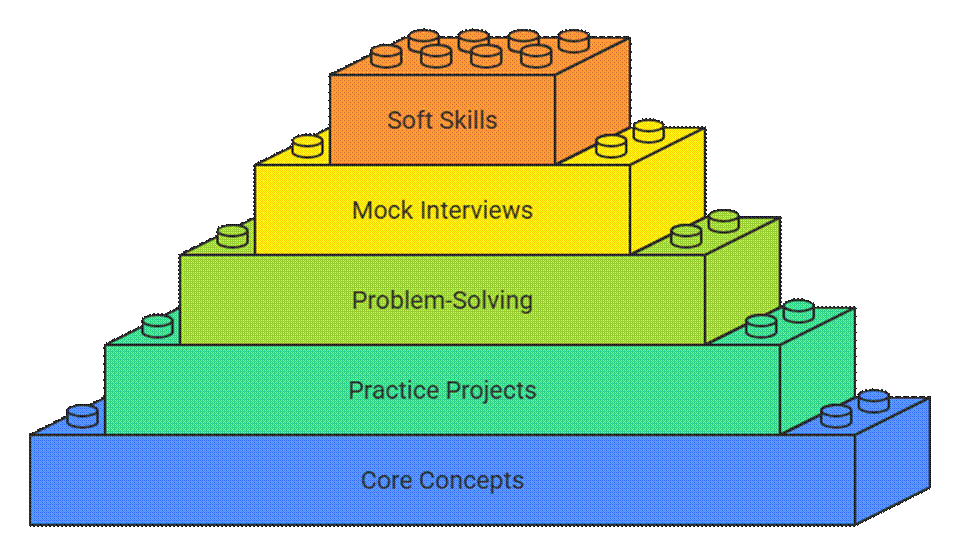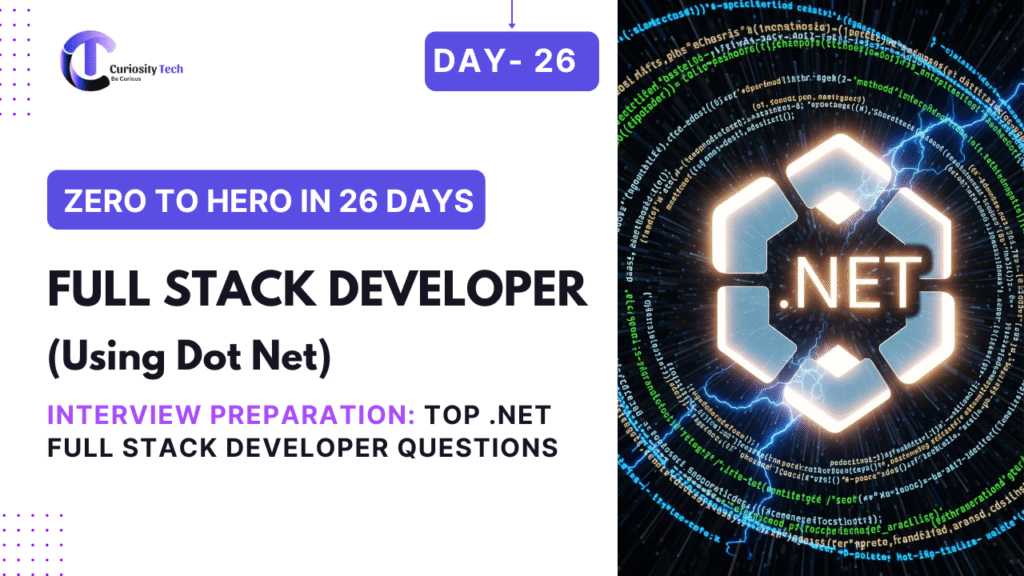Introduction
Interview preparation is the final step in your FullStack .NET career journey. Knowing the top technical questions, practical scenarios, and soft skill strategies can help you stand out to employers.
At CuriosityTech.in, learners receive guidance on technical, behavioral, and scenario-based interviews, ensuring they are industry-ready.
1. Technical Questions
Backend (.NET & C#)
Q 1 : Explain the difference between .NET Core and .NET Framework ?
Answer: .NET Core is cross-platform, open-source, and lightweight. .NET Framework is Windows-only and older.
Q 2 : What is dependency injection and why is it used in ASP.NET Core?
Answer: DI injects dependencies into classes, improving modularity, testability, and maintainability.
Q 3 : Explain async / await in C ?
Answer: Allow non-blocking operations, improving scalability and performance for i/o bound tasks.
Q 4 : What is Entity Framework Core and how does it differ from EF6?
Answer: EF Core is lightweight, cross-platform, supports LINQ, async queries, and improved performance compared to EF6.
Frontend (React/Angular/Blazor)
Q 1 : What are the differences between React and Angular?
Answer: React is a library focused on UI components. Angular is a full framework with tools for routing, forms, and DI.
Q 2 : Explain Blazor WebAssembly.
Answer: Blazor allows building interactive web apps using C# instead of JavaScript, running in the browser via WebAssembly.
Q 3 : How do you handle state management in React?
Answer: Using Context API, Redux, or Zustand for predictable state across components.
Database & API
Q 1 : What are the differences between SQL Server and NoSQL databases?
Answer: SQL Server is relational, structured with schema. NoSQL is non-relational, flexible, and handles unstructured data
Q 2 : Explain REST vs GraphQL APIs.
Answer: REST uses multiple endpoints for resources; GraphQL allows querying multiple resources with a single request.
2. Scenario-Based Questions
Q 1 : Optimize a slow-running ASP.NET Core API.
Answer: Use caching (IMemoryCache), async queries, EF Core projections, and indexing in SQL Server.
Q 2 : Deploy a FullStack app to Azure.
Answer: Publish backend to Azure App Service, frontend to Azure Static Web Apps, configure database and CI/CD pipeline.
Q 3 : Implement JWT authentication in an API.
Answer: Configure ASP.NET Core Identity, generate JWT tokens on login, and validate on API requests with middleware.
3. Behavioral Questions
Q 1 : Tell me about a project you built using .NET FullStack
Answer: Highlight architecture, technologies used, challenges solved, and outcome
Q 2 : How do you handle bugs or production issues?
Answer: Mention profiling, logging, unit tests, and CI/CD rollback strategies.
Q 3 : How do you stay updated with new .NET trends?
Answer: Follow official Microsoft docs, CuriosityTech.in mentorship, and community forums.
4. Real-World Project-Based Practice
Job Portal / Course Platform:
- Prepare questions around authentication, microservices, cloud deployment, caching, async operations, frontend-backend integration.
- Use code snippets from projects to explain answers practically.
5. Tips to Crack the Interview

6. CuriosityTech.in Mentorship Insights
- Structured mock interviews, Q&A sessions, and scenario-based practice
- Real-world project examples to demonstrate problem-solving skills
- Prepares learners for enterprise-level FullStack .NET interviews
Conclusion
Interview preparation is the final milestone in becoming a .NET Full Stack Developer. By mastering technical questions, scenario-based problem-solving, and behavioral skills, learners can confidently secure Full Stack roles. At CuriosityTech.in, mentorship ensures that candidates are industry-ready with practical knowledge, projects, and confidence.
With Day 26 complete, you now have a full 26-day comprehensive roadmap covering C#, ASP.NET Core, frontend integration, cloud deployment, microservices, performance tuning, testing, Git, trends, career planning, and interview prep.



